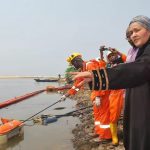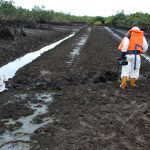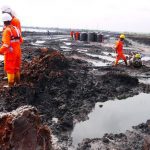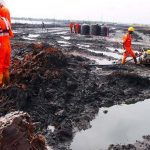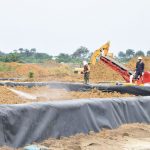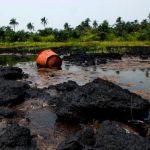A failure by the Hydrocarbon Pollution Remediation Project (HYPREP) to carry out a health audit in Ogoniland before commencing the cleanup process two years ago, could lead to a spike in deaths, following the outbreak of the Coronavirus pandemic, experts said during a webinar hosted from Port Harcourt on Friday.
A panel of frontline environmental rights activists and civil society leaders told journalists at the webinar hosted by Kebetkache, a non-profit focusing on woman empowerment and grassroots development, that skipping UNEP’s emergency measures, including a health audit of the four affected local government areas, could cause more deaths, given the high prevalence of underlying diseases in communities from long years of pollution.
Frontline environmental activist Nnimmo Bassey who led a panel expressed concern in his lead presentation that the cleanup exercise was proceding too slowly in spite of available funding.
In 2016, vice president Yemi Osinbajo launched the Ogoni cleanup project in Bodo City, to much global applause, but real work began only two years after with many watchers accusing the process of lacking transparency and skipping several pre-cleanup action points recommended by UNEP.
The federal government launched the initiative in 2016, five years after the United Nations Environmental Programme submitted its report and recommendations to the administration of then president Goodluck Jonathan.
Even so, controversy continues to trail its execution over breaches to procedure due, mainly, to the non- provision of so-called emergency measures outlined by UNEP to precede the cleanup.
Among others, the measures include the establishment of a centre of excellence for empowerment and training to enable locals acquire skills having lost their farms to pollution. Also recommended was the provision of potable water to communities given the extent of pollution that has left their wells containing cancer-causing agents such as benzene, more than 900 times the level approved by the World Health Organisation.
Experts have often cited inadequate sensitization and non-compliance with these measures as being at the root of factors inhibiting a smooth cleanup process.
A failure by the Hydrocarbon Pollution Remediation Project (HYPREP) to carry out a health audit in Ogoniland before commencing the cleanup process two years ago, could lead to a spike in deaths, following the outbreak of the Coronavirus pandemic, experts said during a webinar hosted from Port Harcourt on Friday.
A panel of frontline environmental rights activists and civil society leaders told journalists at the webinar hosted by Kebetkache, a non-profit focusing on woman empowerment and grassroots development, that skipping UNEP’s emergency measures, including a health audit of the four affected local government areas, could cause more deaths, given the high prevalence of underlying diseases in communities from long years of pollution.
Frontline environmental activist Nnimmo Bassey who led a panel expressed concern in his lead presentation that the cleanup exercise was proceding too slowly in spite of available funding.
In 2016, vice president Yemi Osinbajo launched the Ogoni cleanup project in Bodo City, to much global applause, but real work began only two years after with many watchers accusing the process of lacking transparency and skipping several pre-cleanup action points recommended by UNEP.
The federal government launched the initiative in 2016, five years after the United Nations Environmental Programme submitted its report and recommendations to the administration of then president Goodluck Jonathan.
Even so, controversy continues to trail its execution over breaches to procedure due, mainly, to the non- provision of so-called emergency measures outlined by UNEP to precede the cleanup.
Among others, the measures include the establishment of a centre of excellence for empowerment and training to enable locals acquire skills having lost their farms to pollution. Also recommended was the provision of potable water to communities given the extent of pollution that has left their wells containing cancer-causing agents such as benzene, more than 900 times the level approved by the World Health Organisation.
Experts have often cited inadequate sensitization and non-compliance with these measures as being at the root of factors inhibiting a smooth cleanup process.
A failure by the Hydrocarbon Pollution Remediation Project (HYPREP) to carry out a health audit in Ogoniland before commencing the cleanup process two years ago, could lead to a spike in deaths, following the outbreak of the Coronavirus pandemic, experts said during a webinar hosted from Port Harcourt on Friday.
A panel of frontline environmental rights activists and civil society leaders told journalists at the webinar hosted by Kebetkache, a non-profit focusing on woman empowerment and grassroots development, that skipping UNEP’s emergency measures, including a health audit of the four affected local government areas, could cause more deaths, given the high prevalence of underlying diseases in communities from long years of pollution.
Frontline environmental activist Nnimmo Bassey who led a panel expressed concern in his lead presentation that the cleanup exercise was proceding too slowly in spite of available funding.
In 2016, vice president Yemi Osinbajo launched the Ogoni cleanup project in Bodo City, to much global applause, but real work began only two years after with many watchers accusing the process of lacking transparency and skipping several pre-cleanup action points recommended by UNEP.
The federal government launched the initiative in 2016, five years after the United Nations Environmental Programme submitted its report and recommendations to the administration of then president Goodluck Jonathan.
Even so, controversy continues to trail its execution over breaches to procedure due, mainly, to the non- provision of so-called emergency measures outlined by UNEP to precede the cleanup.
Among others, the measures include the establishment of a centre of excellence for empowerment and training to enable locals acquire skills having lost their farms to pollution. Also recommended was the provision of potable water to communities given the extent of pollution that has left their wells containing cancer-causing agents such as benzene, more than 900 times the level approved by the World Health Organisation.
Experts have often cited inadequate sensitization and non-compliance with these measures as being at the root of factors inhibiting a smooth cleanup process.
A failure by the Hydrocarbon Pollution Remediation Project (HYPREP) to carry out a health audit in Ogoniland before commencing the cleanup process two years ago, could lead to a spike in deaths, following the outbreak of the Coronavirus pandemic, experts said during a webinar hosted from Port Harcourt on Friday.
A panel of frontline environmental rights activists and civil society leaders told journalists at the webinar hosted by Kebetkache, a non-profit focusing on woman empowerment and grassroots development, that skipping UNEP’s emergency measures, including a health audit of the four affected local government areas, could cause more deaths, given the high prevalence of underlying diseases in communities from long years of pollution.
Frontline environmental activist Nnimmo Bassey who led a panel expressed concern in his lead presentation that the cleanup exercise was proceding too slowly in spite of available funding.
In 2016, vice president Yemi Osinbajo launched the Ogoni cleanup project in Bodo City, to much global applause, but real work began only two years after with many watchers accusing the process of lacking transparency and skipping several pre-cleanup action points recommended by UNEP.
The federal government launched the initiative in 2016, five years after the United Nations Environmental Programme submitted its report and recommendations to the administration of then president Goodluck Jonathan.
Even so, controversy continues to trail its execution over breaches to procedure due, mainly, to the non- provision of so-called emergency measures outlined by UNEP to precede the cleanup.
Among others, the measures include the establishment of a centre of excellence for empowerment and training to enable locals acquire skills having lost their farms to pollution. Also recommended was the provision of potable water to communities given the extent of pollution that has left their wells containing cancer-causing agents such as benzene, more than 900 times the level approved by the World Health Organisation.
Experts have often cited inadequate sensitization and non-compliance with these measures as being at the root of factors inhibiting a smooth cleanup process.
A failure by the Hydrocarbon Pollution Remediation Project (HYPREP) to carry out a health audit in Ogoniland before commencing the cleanup process two years ago, could lead to a spike in deaths, following the outbreak of the Coronavirus pandemic, experts said during a webinar hosted from Port Harcourt on Friday.
A panel of frontline environmental rights activists and civil society leaders told journalists at the webinar hosted by Kebetkache, a non-profit focusing on woman empowerment and grassroots development, that skipping UNEP’s emergency measures, including a health audit of the four affected local government areas, could cause more deaths, given the high prevalence of underlying diseases in communities from long years of pollution.
Frontline environmental activist Nnimmo Bassey who led a panel expressed concern in his lead presentation that the cleanup exercise was proceding too slowly in spite of available funding.
In 2016, vice president Yemi Osinbajo launched the Ogoni cleanup project in Bodo City, to much global applause, but real work began only two years after with many watchers accusing the process of lacking transparency and skipping several pre-cleanup action points recommended by UNEP.
The federal government launched the initiative in 2016, five years after the United Nations Environmental Programme submitted its report and recommendations to the administration of then president Goodluck Jonathan.
Even so, controversy continues to trail its execution over breaches to procedure due, mainly, to the non- provision of so-called emergency measures outlined by UNEP to precede the cleanup.
Among others, the measures include the establishment of a centre of excellence for empowerment and training to enable locals acquire skills having lost their farms to pollution. Also recommended was the provision of potable water to communities given the extent of pollution that has left their wells containing cancer-causing agents such as benzene, more than 900 times the level approved by the World Health Organisation.
Experts have often cited inadequate sensitization and non-compliance with these measures as being at the root of factors inhibiting a smooth cleanup process.
A failure by the Hydrocarbon Pollution Remediation Project (HYPREP) to carry out a health audit in Ogoniland before commencing the cleanup process two years ago, could lead to a spike in deaths, following the outbreak of the Coronavirus pandemic, experts said during a webinar hosted from Port Harcourt on Friday.
A panel of frontline environmental rights activists and civil society leaders told journalists at the webinar hosted by Kebetkache, a non-profit focusing on woman empowerment and grassroots development, that skipping UNEP’s emergency measures, including a health audit of the four affected local government areas, could cause more deaths, given the high prevalence of underlying diseases in communities from long years of pollution.
Frontline environmental activist Nnimmo Bassey who led a panel expressed concern in his lead presentation that the cleanup exercise was proceding too slowly in spite of available funding.
In 2016, vice president Yemi Osinbajo launched the Ogoni cleanup project in Bodo City, to much global applause, but real work began only two years after with many watchers accusing the process of lacking transparency and skipping several pre-cleanup action points recommended by UNEP.
The federal government launched the initiative in 2016, five years after the United Nations Environmental Programme submitted its report and recommendations to the administration of then president Goodluck Jonathan.
Even so, controversy continues to trail its execution over breaches to procedure due, mainly, to the non- provision of so-called emergency measures outlined by UNEP to precede the cleanup.
Among others, the measures include the establishment of a centre of excellence for empowerment and training to enable locals acquire skills having lost their farms to pollution. Also recommended was the provision of potable water to communities given the extent of pollution that has left their wells containing cancer-causing agents such as benzene, more than 900 times the level approved by the World Health Organisation.
Experts have often cited inadequate sensitization and non-compliance with these measures as being at the root of factors inhibiting a smooth cleanup process.
A failure by the Hydrocarbon Pollution Remediation Project (HYPREP) to carry out a health audit in Ogoniland before commencing the cleanup process two years ago, could lead to a spike in deaths, following the outbreak of the Coronavirus pandemic, experts said during a webinar hosted from Port Harcourt on Friday.
A panel of frontline environmental rights activists and civil society leaders told journalists at the webinar hosted by Kebetkache, a non-profit focusing on woman empowerment and grassroots development, that skipping UNEP’s emergency measures, including a health audit of the four affected local government areas, could cause more deaths, given the high prevalence of underlying diseases in communities from long years of pollution.
Frontline environmental activist Nnimmo Bassey who led a panel expressed concern in his lead presentation that the cleanup exercise was proceding too slowly in spite of available funding.
In 2016, vice president Yemi Osinbajo launched the Ogoni cleanup project in Bodo City, to much global applause, but real work began only two years after with many watchers accusing the process of lacking transparency and skipping several pre-cleanup action points recommended by UNEP.
The federal government launched the initiative in 2016, five years after the United Nations Environmental Programme submitted its report and recommendations to the administration of then president Goodluck Jonathan.
Even so, controversy continues to trail its execution over breaches to procedure due, mainly, to the non- provision of so-called emergency measures outlined by UNEP to precede the cleanup.
Among others, the measures include the establishment of a centre of excellence for empowerment and training to enable locals acquire skills having lost their farms to pollution. Also recommended was the provision of potable water to communities given the extent of pollution that has left their wells containing cancer-causing agents such as benzene, more than 900 times the level approved by the World Health Organisation.
Experts have often cited inadequate sensitization and non-compliance with these measures as being at the root of factors inhibiting a smooth cleanup process.
A failure by the Hydrocarbon Pollution Remediation Project (HYPREP) to carry out a health audit in Ogoniland before commencing the cleanup process two years ago, could lead to a spike in deaths, following the outbreak of the Coronavirus pandemic, experts said during a webinar hosted from Port Harcourt on Friday.
A panel of frontline environmental rights activists and civil society leaders told journalists at the webinar hosted by Kebetkache, a non-profit focusing on woman empowerment and grassroots development, that skipping UNEP’s emergency measures, including a health audit of the four affected local government areas, could cause more deaths, given the high prevalence of underlying diseases in communities from long years of pollution.
Frontline environmental activist Nnimmo Bassey who led a panel expressed concern in his lead presentation that the cleanup exercise was proceding too slowly in spite of available funding.
In 2016, vice president Yemi Osinbajo launched the Ogoni cleanup project in Bodo City, to much global applause, but real work began only two years after with many watchers accusing the process of lacking transparency and skipping several pre-cleanup action points recommended by UNEP.
The federal government launched the initiative in 2016, five years after the United Nations Environmental Programme submitted its report and recommendations to the administration of then president Goodluck Jonathan.
Even so, controversy continues to trail its execution over breaches to procedure due, mainly, to the non- provision of so-called emergency measures outlined by UNEP to precede the cleanup.
Among others, the measures include the establishment of a centre of excellence for empowerment and training to enable locals acquire skills having lost their farms to pollution. Also recommended was the provision of potable water to communities given the extent of pollution that has left their wells containing cancer-causing agents such as benzene, more than 900 times the level approved by the World Health Organisation.
Experts have often cited inadequate sensitization and non-compliance with these measures as being at the root of factors inhibiting a smooth cleanup process.



